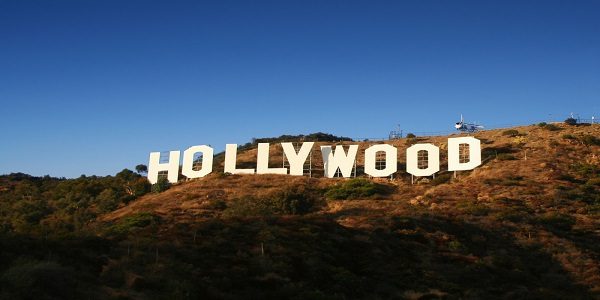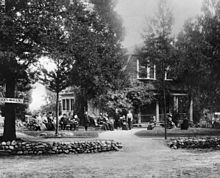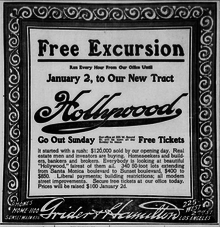
Hollywood
Category : History
Hollywood
Hollywoodis a neighborhood in the central region of Los Angeles, California. The neighborhood is notable for its place as the home of the U.S. film industry, including several of its historic studios. Its name has come to be a metonym for the motion picture industry of the United States. Hollywood is also a highly ethnically diverse, densely populated, economically diverse neighborhood and retail business district.
Hollywood was a small community in 1870 and was incorporated as a municipality in 1903. It officially merged with the city of Los Angeles in 1910, and soon thereafter a prominent film industry began to emerge, eventually becoming the most recognizable film industry in the world.
History
Early history and development
In 1853, one adobe hut stood in Nopalera (Nopal field), named for the Mexican Nopal cactus indigenous to the area. By 1870, an agricultural community flourished. The area was known as the Cahuenga Valley, after the pass in the Santa Monica Mountainsimmediately to the north.
According to the diary of H. J. Whitley, known as the “Father of Hollywood”, on his honeymoon in 1886 he stood at the top of the hill looking out over the valley. Along came a Chinese man in a wagon carrying wood. The man got out of the wagon and bowed. The Chinese man was asked what he was doing and replied, “I holly-wood”, meaning ‘hauling wood.’ H. J. Whitley had an epiphany and decided to name his new town Hollywood. Holly would represent England and wood would represent his Scottish heritage. Whitley had already started over 100 towns across the western United States.[7][8]
Whitley arranged to buy the 500-acre (200 ha) E.C. Hurd ranch and disclosed to him his plans for the land. They agreed on a price and Hurd agreed to sell at a later date. Before Whitley got off the ground with Hollywood, plans for the new town had spread to General Harrison Gray Otis, Hurd’s wife, eastern adjacent ranch co-owner Daeida Wilcox, and others.
Glen-Holly Hotel, first hotel in Hollywood, at the corner of what is now Yucca Street. It was built in the 1890s.Daeida Wilcox may have learned of the name Hollywood from Ivar Weid, her neighbor in Holly Canyon (now Lake Hollywood) and a prominent investor and friend of Whitley’s.[9][10] She recommended the same name to her husband, Harvey. H. Wilcox. In August 1887, Wilcox filed with the Los Angeles County Recorder’s office a deed and parcel map of property he had sold named “Hollywood, California.” Wilcox wanted to be the first to record it on a deed. The early real-estate boom busted that same year, yet Hollywood began its slow growth.
By 1900, the region had a post office, newspaper, hotel, and two markets. Los Angeles, with a population of 102,479 lay 10 miles (16 km) east through the vineyards, barley fields, and citrus groves. A single-track streetcar line ran down the middle of Prospect Avenue from it, but service was infrequent and the trip took two hours. The old citrus fruit-packing house was converted into a livery stable, improving transportation for the inhabitants of Hollywood.
The intersection of Hollywood and Highland, 1907The Hollywood Hotel was opened in 1902 by H. J. Whitley, president of the Los Pacific Boulevard and Development Company. Having finally acquired the Hurd ranch and subdivided it, Whitley built the hotel to attract land buyers. Flanking the west side of Highland Avenue, the structure fronted on Prospect Avenue, which, still a dusty, unpaved road, was regularly graded and graveled. The hotel was to become internationally known and was the center of the civic and social life and home of the stars for many years.[11]
Whitley’s company developed and sold one of the early residential areas, the Ocean View Tract.[12] Whitley did much to promote the area. He paid thousands of dollars for electric lighting, including bringing electricity and building a bank, as well as a road into the Cahuenga Pass. The lighting ran for several blocks down Prospect Avenue. Whitley’s land was centered on Highland Avenue.[13][14] His 1918 development, Whitley Heights, was named for him.
Cr:https://en.wikipedia.org/wiki/Hollywood#History



 Los Angeles
Los Angeles Bangkok
Bangkok